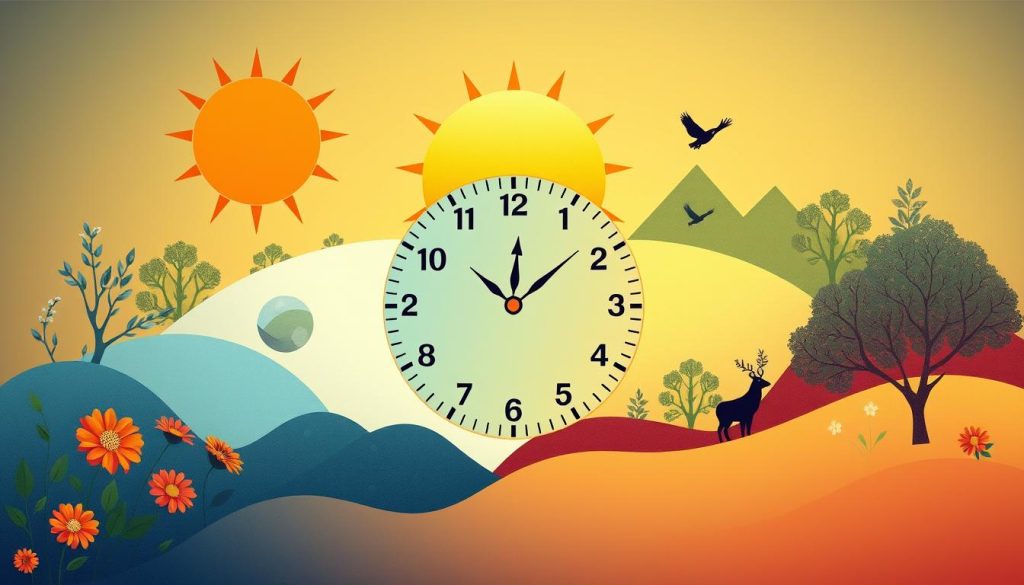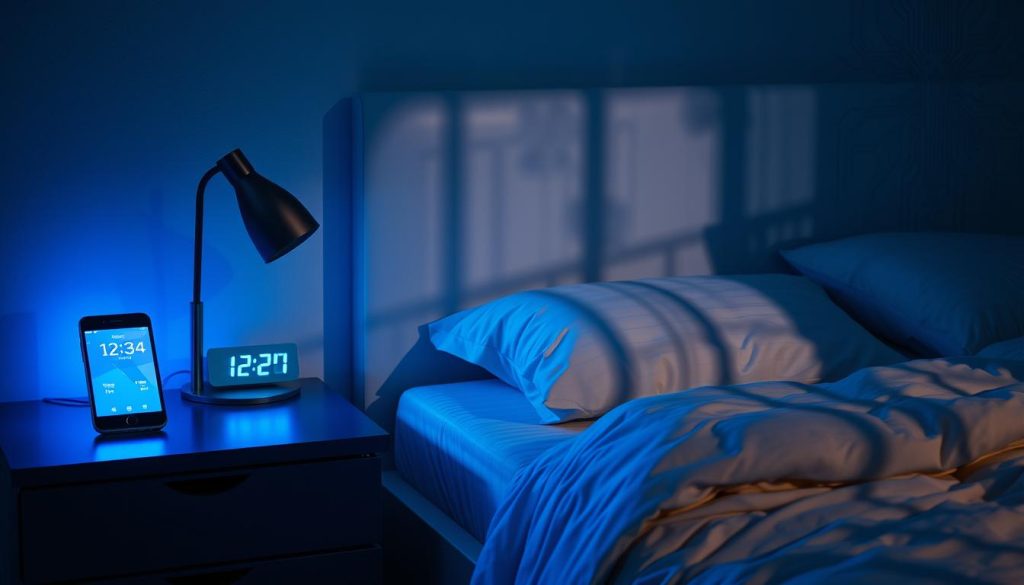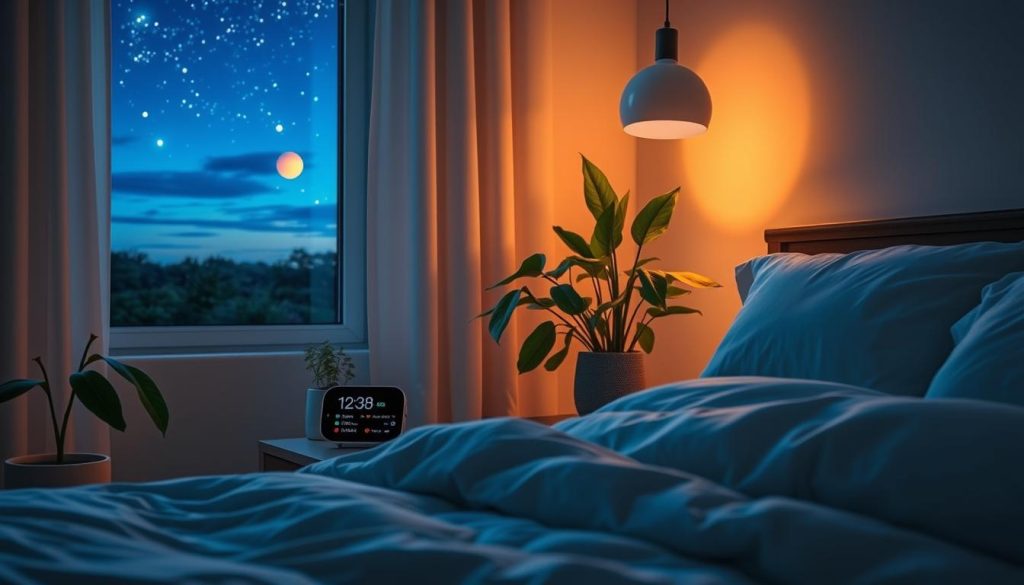In today’s fast-paced world, the link between my circadian rhythm and technology is crucial. Daily tasks often involve screens, posing challenges to my sleep and well-being. It’s key to find a balance between digital use and my natural rhythms for better health.
In this article, I’ll share tips and insights to blend technology use with natural rhythms. This will improve my sleep and productivity.
Understanding Circadian Rhythm
The circadian rhythm is key to our daily lives. It controls many biological processes. It runs on a 24-hour cycle, helping us sleep and wake up.
Let’s explore what circadian rhythms are and why they’re important to us.
What is Circadian Rhythm?
The circadian rhythm is like an internal clock in our bodies. It syncs with light and temperature from the outside world. The National Institute of General Medical Sciences says it controls when we sleep, eat, and release hormones.
My body naturally follows these rhythms. It responds to daylight and darkness, affecting my energy and health.
The Importance of Circadian Rhythm in Daily Life
Knowing how important circadian rhythms are is crucial. Disruptions can cause sleep disorders, mood swings, and lower productivity. The American Sleep Association warns of long-term harm from misalignment.
Staying in sync with these rhythms helps my mental and physical health. By listening to my body’s natural clock, I live a healthier life.

The Impact of Technology on Sleep
Technology greatly affects how well we sleep. Too much screen time, especially at night, makes it hard to fall asleep and sleep well. Blue light from screens messes with our melatonin, the sleep hormone. Harvard Health Publishing says we need to change our bedtime routines to fight this.
How Screens Affect My Sleep Quality
Too much device time before bed hurts my sleep. Studies show screens make sleep worse. I’ve noticed:
- It’s hard to fall asleep because I’m too alert.
- I wake up a lot during the night.
- I sleep less overall.

Identifying Technology-Induced Sleep Disruption
It’s key to understand how tech use affects our sleep. I’ve started tracking my device use and sleep problems. Here’s what I found:
| Device Used | Time Spent (Hours) | Sleep Quality Rating (1-10) |
|---|---|---|
| Smartphone | 2 | 4 |
| Tablet | 1.5 | 5 |
| Laptop | 2 | 3 |
Tracking this has shown me how bad device use is at night. Seeing the link between screens and sleep loss pushes me to change my evening habits for better sleep.
Circadian Rhythm and Technology: Harmony Tips
Using technology can sometimes mess with my sleep cycle. But, I’ve found ways to keep my tech use in check. By setting limits on screen time and using devices that help me sleep, I feel better overall.
Setting Boundaries with Screen Time
It’s key to set limits on screen time for good health. I make sure to avoid screens an hour before bed. This helps me relax and sleep better. The Centers for Disease Control and Prevention says this helps both adults and kids.
Keeping an eye on how much I use tech makes a big difference. It helps me feel better every day.
Using Technology to Promote Better Sleep
Setting limits is important, but tech can also help me sleep. There are apps and devices that track my sleep and offer tips. They have features like guided meditation and calming sounds to help me sleep.
The Sleep Foundation suggests apps that can help me sleep better. Using these tools with my screen limits makes me healthier and sleep better.

Blue Light and Its Effects
Blue light comes from devices like smartphones, computers, and TVs. It affects my sleep. Knowing how it impacts my body helps me stay healthy.
Understanding Blue Light Emission
Blue light makes my brain think it’s still day. It stops melatonin, the sleep hormone. This makes it hard to sleep at night.
LED screens, like those on phones and computers, are big culprits. Using them before bed is especially bad.
Strategies to Reduce Blue Light Exposure
There are ways to cut down on blue light. Here are some tips that work for me:
- Use blue light filter glasses in the evening.
- Turn on night mode on devices to soften the light.
- Limit screen time an hour before bed.
- Use apps or tools to dim screens and reduce blue light.
| Method | Description | Effectiveness |
|---|---|---|
| Blue Light Filter Glasses | Glasses that block blue light to reduce eye strain. | High |
| Night Mode Settings | Settings that alter screen colors to warmer tones. | Moderate |
| Screen Dimmer Apps | Applications that adjust light emission based on time of day. | High |
| Technology Curfews | Designating no-screen times, especially before bed. | Very High |
Using these methods helps me sleep better. It’s important to manage light to keep a good sleep routine.
Smart Devices and Sleep Enhancement
In my search for better sleep, I found smart devices that really help. They use sleep tracking apps and smart lighting to make my sleep better.
Sleep Apps That Help Me Stay on Track
Using sleep tracking apps changed how I see my sleep. They track sleep duration and quality, giving me tips. Some top apps I use are:
- Sleep Cycle: It wakes me up when I’m in a light sleep phase.
- Pillow: It tracks my sleep movements and stages.
- Sleep as Android: A smart alarm that tracks my sleep with other devices.
The Sleep Foundation says these apps can make my sleep better. They help me understand and improve my sleep habits.
Smart Lighting Solutions for Better Circadian Rhythm
Smart lighting is key for a healthy sleep cycle. These lights change color and brightness like the sun. Philips Hue bulbs, for example, can wake me up or help me sleep.
| Smart Lighting Features | Benefits |
|---|---|
| Adaptive Brightness | Adjusts light to ease waking or sleeping. |
| Color Temperature Adjustment | Simulates natural sunlight, helping my body clock. |
| Programmable Schedules | Let me set lighting for my sleep routines. |
Using sleep tech has made my life better. It helps me sleep well every night.
Mindfulness and Digital Detox
Adding mindfulness to my daily life has boosted my well-being. Mindfulness helps me focus and manage my feelings, which is key for a good sleep cycle. Activities like meditation or yoga help me relax, especially before bed.
The Role of Mindfulness in Regulating My Circadian Rhythm
Mindfulness, like deep breathing and muscle relaxation, cuts down my stress. These methods help me ease into sleep as night falls. By staying in the moment, I calm my nerves and improve my sleep.
How a Digital Detox Can Benefit My Sleep
Stepping away from screens has greatly helped my sleep. It lets me connect with the world around me and avoid constant alerts. This break from tech improves my sleep habits and keeps my schedule steady, free from late-night distractions.
Creating a Sleep-Friendly Environment
To improve my sleep, I’ve learned that a sleep-friendly environment is key. Keeping my bedroom cool, between 60 and 67 degrees Fahrenheit, is crucial. This cool temperature helps my body relax and sleep better.
I’ve also chosen my bedroom decor carefully. Blackout curtains block out light and add coziness. Soft bedding and calming colors make my space relaxing. These choices help me unwind and sleep better.
Sound machines are also important for me. They create white noise that masks other sounds. This peaceful atmosphere has greatly improved my sleep and overall health. A well-designed bedroom is essential for a good night’s rest.

